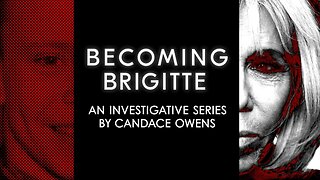Premium Only Content

Episode 2366: The Duty to Rebuke Error - Nightly Episode
“O my God, at the end of this day I thank You most heartily for all the graces I have received from You. I am sorry that I have not made better use of them. I am sorry for all the sins I have committed against You. Forgive me, O my God, and graciously protect me this night. Blessed Virgin Mary, my dear heavenly mother, take me under your protection. St. Joseph, my dear Guardian Angel, and all you saints in heaven, pray for me. Sweet Jesus, have pity on all poor sinners, and save them from hell. Have mercy on the suffering souls in purgatory. Amen”
Tonight, we will explore the imperative of confronting error and sin, drawing on the wisdom of Pope St. Celestine I and St. Peter Julian Eymard. In a world where silence can sometimes be mistaken for tolerance, we are reminded of our duty to speak out against sin and error, not only for our own salvation but for the good of others and the glory of God.
The Duty to Rebuke Error
Pope St. Celestine I offers a powerful directive:
"We are deservedly to blame if we encourage error by silence. Therefore rebuke these people. Restrain their liberty of preaching."
In an age where relativism often reigns supreme, Pope St. Celestine I’s words remind us of the critical importance of standing up for the truth. Silence in the face of error is not a neutral act; it is an implicit endorsement. As Catholics, we have a duty to rebuke error and restrain false teachings. This is not an act of intolerance but of love, seeking to guide others towards the truth that sets us free (John 8:32). By correcting errors, we help to protect the integrity of the faith and support the spiritual well-being of our brothers and sisters in Christ.
The Nature and Gravity of Sin
St. Peter Julian Eymard elaborates on the nature of sin:
"What displeases God most on earth and in us is sin. You must give this truth your attentive consideration. The just and the saints themselves are not exempt from sin. And we, have we not at least venial sins on our conscience? Have we never had to weep for mortal sins? There is only one evil on earth, only one thing which should fill us with dread: sin. All created things please God, even those which seem obnoxious to us; neither the earthworm nor mud are offensive in the sight of God. Those things are in their natural state. Sin, on the contrary, is a perversion of the divine will, a degradation of God's work, a contradiction to his nature and to his divine being. Sin is an offense and an insult to God's sovereign authority, to his majesty, and to his empire; it is an insult of the creature to its Creator."
St. Peter Julian Eymard's words provide a sobering reflection on the nature of sin. Unlike the created things of the world, which are inherently good and pleasing to God, sin is a direct affront to His divine will and majesty. It is essential for us to understand the gravity of sin—not just mortal sins but venial ones as well. Sin disrupts our relationship with God and distorts His creation. Recognizing this helps us to approach our own sins with genuine contrition and a sincere desire for repentance. It also underscores the importance of helping others to see and turn away from their sins, fulfilling our duty to admonish the sinner, one of the spiritual works of mercy.
Acting with Courage and Charity
As we consider these teachings, it becomes clear that confronting error and sin requires both courage and charity. It is not enough to simply point out mistakes; we must do so with a spirit of love and a desire for the ultimate good of others. This approach ensures that our actions are aligned with Christ’s teachings and are genuinely aimed at bringing others closer to God.
We must also be mindful of our own shortcomings and approach this task with humility. By acknowledging our own need for God’s mercy and striving to live virtuously, we set an example for others to follow. Our lives become a testament to the transformative power of God’s grace, encouraging others to seek the same.
Conclusion
In closing, let us remember the words of Pope St. Celestine I and St. Peter Julian Eymard as we navigate the challenges of living and proclaiming our faith. We are called to be vigilant against error and sin, speaking out with courage and love. By doing so, we uphold the truth of the Gospel and contribute to the spiritual growth of ourselves and those around us.
Thank you for joining this evening. May God us the wisdom and strength to confront error with love and to live lives that reflect His divine will. Until next time, may God bless you and keep you in His grace.
-
 20:41
20:41
Stephen Gardner
10 hours ago🔥You Won't BELIEVE What JUST Happened To Don Trump Jr.!!
105K145 -
 58:00
58:00
The StoneZONE with Roger Stone
8 hours agoEuropean Leaders Resist Trump Peace Overtures To Their Own Demise | The StoneZONE w/ Roger Stone
73.3K12 -
 9:29
9:29
AlaskanBallistics
9 hours ago $7.25 earnedWyoming Suppressors and Rifles at Shot Show 2025
82.6K4 -
 1:06:40
1:06:40
Donald Trump Jr.
13 hours agoThe Left is Taking one L After Another, Live with Michael Knowles | Triggered Ep. 217
175K113 -
 47:17
47:17
Kimberly Guilfoyle
13 hours agoWoke Gets DOGE’d, Live with AJ Rice & Jarrett Stepman | Ep. 197
129K43 -
 20:11
20:11
Candace Show Podcast
12 hours agoBecoming Brigitte: Candace Owens x Xavier Poussard | Ep 6
193K330 -
 8:25:38
8:25:38
Dr Disrespect
16 hours ago🔴LIVE - DR DISRESPECT - ELDEN RING DLC - REVENGE
194K22 -
 54:22
54:22
LFA TV
1 day agoThe End of the Trans-Atlantic Alliance | TRUMPET DAILY 2.17.25 7PM
50.2K7 -
 55:56
55:56
BIG NEM
15 hours agoUGLY COCO: The Rapper Who’s Tried EVERY PSYCHEDELIC 🌌
22.6K1 -
 1:42:51
1:42:51
2 MIKES LIVE
13 hours ago2 MIKES LIVE #181 Deep Dive Monday!
26.8K3